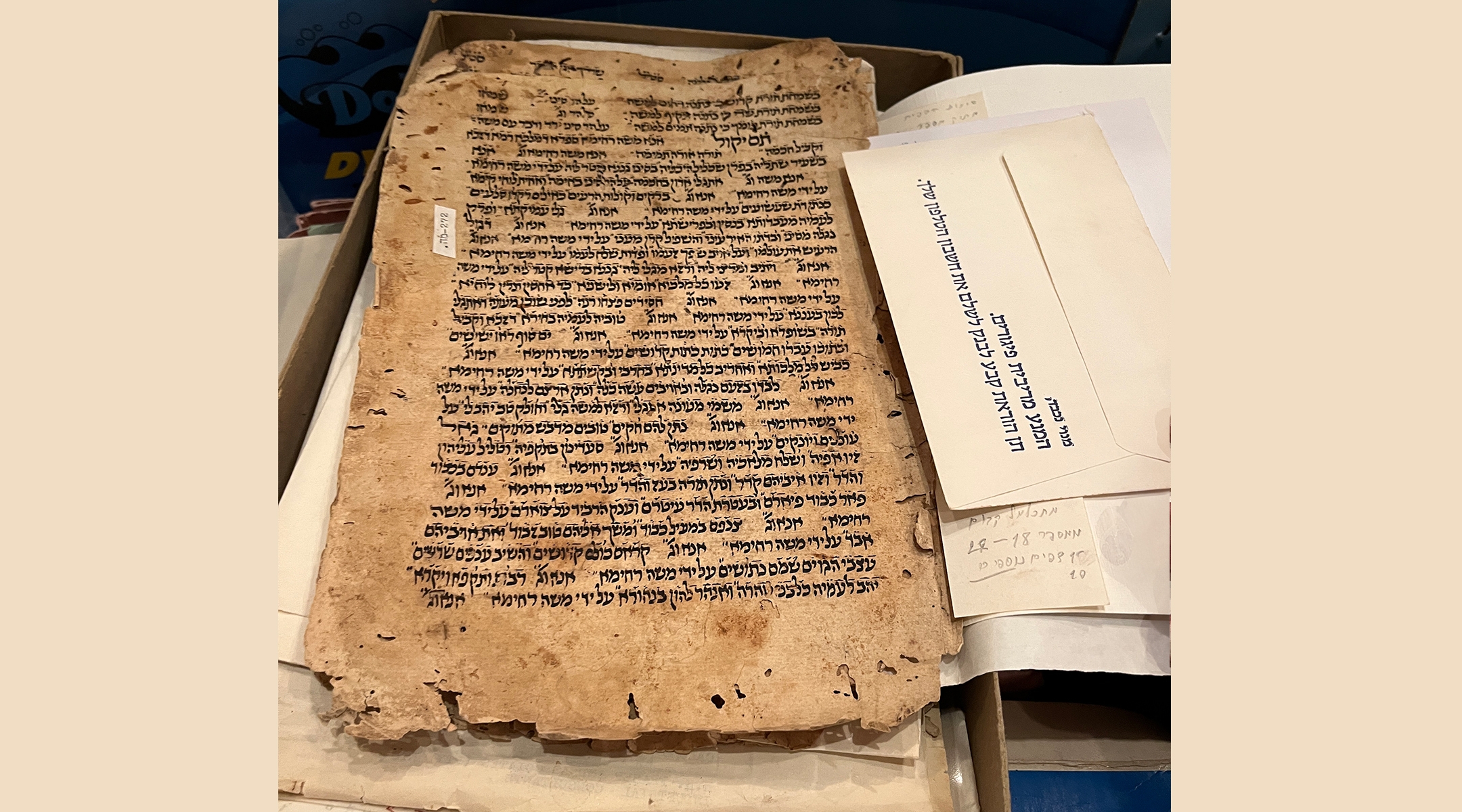Major Judaica collection amassed by Yemenite Jewish butcher donated to the National Library of Israel
“It’s the largest Hebrew manuscript collection assembled since the early 20th century,” said one scholar

The Nahum Collection of Yemenite Manuscripts comprises 60,000 Yemenite-Jewish manuscripts and fragments that will now be available to researchers and scholars at the National Library of Israel. (NLI)
(JTA) — The National Library of Israel has announced the acquisition of 60,000 Yemenite Jewish manuscripts and text fragments which made up one of the most significant private collections of Judaica in the world.
The massive collection was donated by the descendants of Yehuda Levi Nahum, a butcher who died in 1998 after spending more than 50 years meticulously acquiring and studying the material. It includes Judeo-Yemenite translations of works by the medieval intellectual giant Maimonides, and writings by Yihya Saleh, a leading 18th-century rabbinic law scholar from Yemen, as well as ancient Jewish marriage contracts.
“This important collection is a transformative addition to the library’s documentation of Yemenite-Jewish heritage that will enrich scholarship in this field for years to come,” Chaim Neria, the curator of the Judaica collection at the National Library, said in a statement.
David Selis, a research fellow at Yeshiva University specializing in modern Jewish cultural history, compared the famous collections amassed by the bibliophile Elkan Nathan Adler and the Sassoon dynasty.
“It’s the largest Hebrew manuscript collection assembled since the early 20th century, and the most comprehensive Yemenite manuscript collection ever assembled,” Selis told the Jewish Telegraphic Agency.
The news is also significant because of the contentious history shared by the National Library and the Yemenite Jewish community. Thousands of books, manuscripts, and cultural artifacts were stolen from the community during and after their voyage and absorption in Israel, in some cases by the government representatives entrusted with shepherding the community from Yemen. Many items ended up at the National Library, which refused in almost every case to return the books to their owners.
“It would have been better that alongside efforts to preserve the manuscripts and and make them accessible, the library would also discuss and acknowledge the theft of Yemenite manuscripts during the community’s mass immigration to Israel, and clarify its role in the matter,” Rafi Shubeli, a Yemenite Jewish activist in Israel, wrote in a Facebook post.
The collection was handed over last Thursday on a date coinciding on the Hebrew calendar with the anniversary of the death of Shalom Shabazi, the 17th-century Yemenite poet and rabbi.
The unlikely story of this accumulation of Jewish literary riches begins a century ago in the town of Sanaa in Yemen when Nahum was an enterprising young teenager.
Born to a family with limited means, he had saved up some money by selling candy and clothing. At age 14, he convinced his parents to allow him to leave the country and travel hundreds of miles to the Holy Land, according to a biography on the website of the Friedberg Jewish Manuscript Society, which helped digitize Nahum’s collection.
It was 1929, long before the eventual mass emigration of Yemenite Jewry.
Nahum traveled by donkey for two weeks from Sanaa to the port town of Aden, where he sold the donkey to pay for boat fare to get to Port Said, Egypt. From there he took a train to Jerusalem in Mandatory Palestine and eventually settled in Tel Aviv.
As a young man, he decided to dedicate his life to the preservation and Yemenite Jewish heritage. He sought to highlight the cultural vitality of his community in the face of condensing racial stereotypes that were prevalent among the Ashkenazi majority at the time.
Earning a living as a butcher, he spent his free time collecting handwritten books. He started by writing to his parents in Yemen requesting items; they didn’t arrive until 1949 with Operation Magic Carpet, which brought the bulk of Yemenite Jewry to Israel. Later, he visited the immigrant camps and acquired books from the new arrivals.
Realizing that many books were bound using the paper of older books, he took apart the covers and discovered ancient manuscript fragments, amassing 15,000 of the items in the collection in this way.
Nahum kept the collection at his home in the town of Holon and hosted scholars and dignitaries. Israeli presidents Zalman Shazar and Yitzhak Ben-Zvi (also a historian who sought to import important Jewish texts to the new state) among his visitors. He was a scholar as well as a collector and published nine books based on his research of the texts.
Many of the most significant items in the collection have been cataloged and digitized over the years, but the National Library believes that many more gems in the collection are awaiting discovery by future scholars.
This article originally appeared on JTA.org.



















